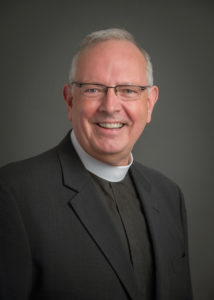On Sunday afternoon, I will be joining my spouse Thomas Brown and traveling to North Carolina, where we will be spending much of the week. As many of you know, Thomas was recently selected as one of four nominees for the election of the next bishop of the Diocese of Western North Carolina. We will be traveling throughout the diocese next week for their “Meet the Candidates” events , sometimes referred to as “Walkabouts.” These sessions provide an opportunity for members of the diocese to personally meet all of the candidates. A number of you have asked me questions about this process, and how it came about, and I thought it would be helpful for all of us to share some more information about what will be happening in the next two months.
Q: How are the names of candidates for bishops determined?
A: When a diocese announces a search for a new bishop, names of possible candidates can be submitted by anyone. A close friend and colleague of Thomas submitted his name, and encouraged Thomas to consider being part of the discernment process. Thomas, with my full support, let his name go forward, knowing well that either he or the diocese could choose at any time not to continue the mutual discernment.
Q: Is the search for a bishop like the search for a rector?
A: In some ways, the processes are similar. A discernment committee (sometimes called a search committee) was established by the diocese, and their job was to establish a profile for the diocese and to identify and interview potential candidates. What differs is that while a rector discernment committee is often asked to bring one, or at the most, two candidates to the vestry for a final decision, the diocesan discernment committee was asked to identify several candidates for a slate. In the case of the Diocese of Western North Carolina, a slate of four candidates was announced (the profiles of all the candidates can be found here.)
Q: Who elects a bishop?
A: The bishop of any diocese of the Episcopal Church is elected by a special Electing Convention of the diocese. The members of the convention are the same as those who meet each year for the annual diocesan convention: all clergy who are canonically resident in the diocese, and two lay delegates from each parish in the diocese. When our diocese elected the Rev. Alan Gates in 2014, Steve Spinetto and Scott Squillace were the delegates from St. John’s, and Dick Simeone, Lyn Brakeman and I voted as clergy of the diocese.
Q: How is a bishop elected?
A: Clergy and lay votes, taken by secret ballot, are counted separately. In order to be elected, a candidate must receive a simple majority of clergy votes and a simple majority of lay votes. After the votes are counted, the results are announced. If no candidate is successful in achieving the required majorities, after an initial ballot, subsequent ballots are taken until someone has done so.
Q: What are the next steps in the process?
A: As I mentioned above, Thomas and I, along with the other candidates and spouses, will be attending four different “Meet the Candidates” presentations next week. Delegates, as well as anyone else interested, are welcome to attend these events. Candidates have a chance to introduce themselves, and move amongst smaller groups to individually answer questions posed to them. The time in North Carolina also gives the candidates and spouses time to learn more about the diocese.
Q: When is the election?
A: Delegates will meet in Asheville on Saturday June 25th for the election. The diocese expects their new bishop to begin work there in September, and the consecration of the new bishop will be on October 1.
Q: What does this mean for us?
A: The next six weeks does create some uncertainty as we think about our life together in the year ahead. If Thomas is elected, I would begin a conversation with the vestry about the timing of my own departure, which would likely be sometime in the early fall. If there is no election, both Thomas and I will gladly continue in the positions to which we have been called, and to which we are committed.
Despite any uncertainly, I do not believe that we need to put any of our ministries, or our hopes and dreams for what we can be doing here at St. John’s, “on hold.” The vestry, for example, will be engaging in strategic planning at a vestry retreat in September, and I will be sharing more in the month to come about how all of us can assist them in planning for our future. We have been so abundantly blessed here at St. John’s. I ask you to continue to hold this parish, its leadership, and all of its members in your prayers as we move forward. Of some things we can never be certain of, but we can be assured that God hears us, leads us, and sustains us in all things.
Faithfully,
Tom
